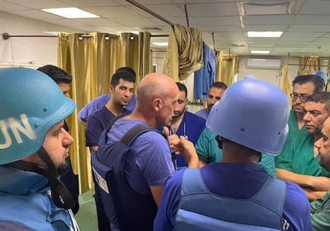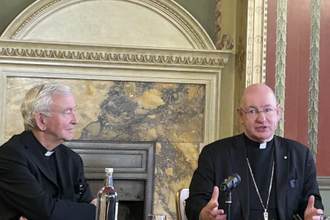Al-Shifa Hospital in Gaza 'a death zone'

WHO-led team visits Al Shifa Hospital in Gaza
Source: WHO, Vatican News
International doctors who visited the Al Shifa hospital in Gaza on Saturday say its now 'like a death zone'.
A joint UN humanitarian assessment team led by the World Health Organisation accessed Al-Shifa Hospital in northern Gaza to assess the situation on the ground, conduct a rapid situational analysis, assess medical priorities and establish logistics options for further missions.
The team included public health experts, logistics officers and security staff from OCHA, UNDSS, UNMAS/UNOPS, UNRWA and WHO.
The mission was accompanied by the Israel Defense Forces (IDF) to ensure safe passage along an agreed route. However, this was a high-risk operation in an active conflict zone, with heavy fighting ongoing in close proximity to the hospital.
Earlier in the day, the IDF had issued evacuation orders to the remaining 2500 internally displaced people who had been seeking refuge on the hospital grounds. They, along with a number of mobile patients and hospital staff, had already vacated the facility by the time of the team's arrival.
Due to time limits because of the security situation, the team was able to spend only one hour inside the hospital, which they described as a "death zone," and the situation as "desperate." Signs of shelling and gunfire were evident. The team saw a mass grave at the entrance of the hospital and was told more than 80 people were buried there.
Lack of clean water, fuel, medicines, food and other essential aid over the last six weeks have caused Al-Shifa Hospital - once the largest, most advanced and best equipped referral hospital in Gaza - to essentially stop functioning as a medical facility.
The team observed that due to the security situation, it has been impossible for the staff to carry out effective waste management in the hospital. Corridors and the hospital grounds were filled with medical and solid waste, increasing the risk of infection. Patients and health staff with whom they spoke were terrified for their safety and health, and pleaded for evacuation. Al-Shifa Hospital can no longer admit patients, with the injured and sick now being directed to the seriously overwhelmed and barely functioning Indonesian Hospital.
There are 25 health workers and 291 patients remaining in Al-Shifa, with several patient deaths having occurred over the previous two to three days due to the shutting down of medical services. Patients include 32 babies in extremely critical condition, two people in intensive care without ventilation, and 22 dialysis patients whose access to life-saving treatment has been severely compromised. The vast majority of patients are victims of war trauma, including many with complex fractures and amputations, head injuries, burns, chest and abdominal trauma, and 29 patients with serious spinal injuries who are unable to move without medical assistance. Many trauma patients have severely infected wounds due to lack of infection control measures in the hospital and unavailability of antibiotics.
Given the current state of the hospital, which is no longer operational or admitting new patients, the team was requested to evacuate health workers and patients to other facilities. WHO and partners are urgently developing plans for the immediate evacuation of the remaining patients, staff and their families. Over the next 24-72 hours, pending guarantees of safe passage by parties to the conflict, additional missions are being arranged to urgently transport patients from Al-Shifa to Nasser Medical Complex and European Gaza Hospital in the south of Gaza. However, these hospitals are already working beyond capacity, and new referrals from Al-Shifa Hospital will further strain overburdened health staff and resources.
WHO is deeply concerned about the safety and health needs of patients, health workers and internally displaced people sheltering at the few remaining partially functional hospitals in the north, which are facing the risk of closure due to a lack of fuel, water, medical supplies and food, and the intense hostilities. Immediate efforts must be made to restore the functionality of Al-Shifa and all other hospitals to provide urgently needed health services in Gaza.
WHO reiterates its plea for collective efforts to bring an end to the hostilities and humanitarian catastrophe in Gaza. We call for an immediate ceasefire, the sustained flow of humanitarian assistance at scale, unhindered humanitarian access to all of those in need, the unconditional release of all hostages, and the cessation of attacks on health care and other vital infrastructure. The extreme suffering of the people of Gaza demands that we respond immediately and concretely with humanity and compassion.
During the Angelus on Sunday Pope Francis once again appealed for peace and called for prayers for those suffering in Palestine and Israel, Myanmar and Ukraine. He highlighted the fact that the only ones who gain from war are the manufacturers of weapons.
"Peace is possible. It takes goodwill," said Pope Francis on Sunday and he implored men and women of goodwill never to resign themselves to war.
Focussing on Myanmar where an escalation of hostilities between the country's military junta and ethnic minority armed group, the Arakan Army, have spread to various townships where civilians have been caught in the crossfire, the Pope said: "I renew my closeness to the dear people of Myanmar who unfortunately continue to suffer from violence and suppression. I pray that they will not be discouraged and always trust in the Lord's help."
The Pope finally asked for prayers "for the tormented Ukraine and for the people of Palestine and Israel."


















